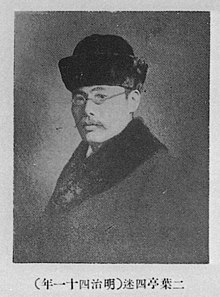| This article needs additional citations for verification. Please help improve this article by adding citations to reliable sources. Unsourced material may be challenged and removed. Find sources: "Futabatei Shimei" – news · newspapers · books · scholar · JSTOR (September 2021) (Learn how and when to remove this message) |
| Futabatei Shimei | |
|---|---|
 Futabatei Shimei in 1908 Futabatei Shimei in 1908 | |
| Born | (1864-04-04)4 April 1864 Edo, Japan |
| Died | 10 May 1909(1909-05-10) (aged 45) Bay of Bengal |
| Occupation | Writer, translator, literary critic |
| Genre | Short stories, novels, essays |
| Literary movement | Realism |
Futabatei Shimei (二葉亭 四迷, 4 April 1864 – 10 May 1909) was a Japanese writer, translator, and literary critic. His writings are in the realist style popular in the mid to late 19th century. His work The Drifting Cloud (Ukigumo, 1887) is widely regarded as Japan's first modern novel.
Biography
Futabatei was born Hasegawa Tatsunosuke in Edo (now Tokyo). After quitting his studies at the Russian language department at the Tokyo Foreign Language School in protest over administrative restructuring, Futabatei published the literary criticism Shōsetsu Sōron at the encouragement of the critic and author Tsubouchi Shōyō in 1886. Futabatei's first novel Ukigumo is often said to be unfinished, but its realist style strongly influenced fellow authors in his day. Futabatei was accomplished in Russian and translated the work of Ivan Turgenev and other Russian realists into Japanese.
In 1902, he learned Esperanto in Russia. Returning to Japan in 1906, he published the first Japanese-Esperanto instruction book Sekaigo.
Futabatei died of tuberculosis on the Bay of Bengal while returning from Russia as a special correspondent for the Asahi Shimbun newspaper. He was cremated and buried in Singapore.
The origin of Futabatei's pen name (a reference to "kutabatte shimae", lit. "drop dead") has been the repeated subject of speculation (including the allegation that these had been his father's words when he learned of his son's plans to study literature). Futabatei claimed that these were the words of his inner voice while in conflict between his artistic ideals and monetary aspirations.
Works
Novels
- 1887: Ukigumo (浮雲)
- 1906: An Adopted Husband (其面影, Sono Omokage)
- 1907: Heibon (平凡)
Essays
- 1885: Bijutsu no hongi
- 1886: Shōsetsu Sōron (小説総論)
References
- Ryan, Marleigh Grayer (1990). Japan's first modern novel, Ukigumo of Futabatei Shimei. Ann Arbor, Mich.: Center for Japanese Studies, University of Michigan. p. 131. ISBN 0-939512-44-0. OCLC 21035179.
- Washburn, Dennis C. (1995). The Dilemma of the Modern in Japanese Fiction. Yale University Press. p. 107. ISBN 9780300105254.
External links
- e-texts of Shimei's works at Aozora bunko
- Shimei's grave in Singapore's Japanese Cemetery
- Works by Shimei Futabatei at Project Gutenberg
- Works by or about Futabatei Shimei at the Internet Archive
- An Adopted Husband (English trans. 1919)